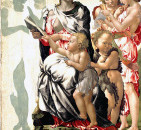The Madonna and Child with St John and Angels (c. 1495-1497) is a painting in tempera on wood by Michelangelo during his first period in Rome. The painting is unfinished and describes the meeting of Virgin Mary and the Child Jesus with Christ's cousin St John the Baptist, on the Holy Family's Flight into Egypt. The Virgin is depicted with one breast bared, as if she has recently been suckling her infant son; recalling the theme of the Virgin breastfeeding common in medieval painting. In her hands is a book which she attempts to hold away from her son, the contents of which may have foretold his future sacrifice. She looks over her left shoulder onto a scroll being read by a pair of angels; most likely to be the scroll reading Ecce Agnus Dei ('Behold the Lamb of God'), usually an attribute of John the Baptist.
The figures are arranged as if in a frieze, revealing Michelangelo's sculptor's instinct. The frieze becomes more convex at its center with the figures of Virgin and Child, as in the later Pitti Tondo. Another similarity to relief sculpture is in the plain background: rather than the landscapes more common for exterior settings, Michelangelo has simply painted an expanse of sky. He also eschewed the richly-decorated throne typical of sacra conversazione altarpieces, and de-emphasized the angels' wings.
Many areas of the painting are in a preliminary state; the black of the Virgin's robe was meant to be overpainted with the rich blue pigment lapis lazuli, and the angels on the left are indicated only by the green underpaint used for flesh tones.
The Madonna and Child with St John and Angels is one of three surviving panel paintings housed in the UK National Gallery in London.
- ส่วนหนึ่งของคำพูด: proper noun
- อุตสาหกรรม/ขอบเขต: Arts & crafts
- Category: Oil painting
Other terms in this blossary
ผู้สร้าง
- Xena
- 100% positive feedback
(Los Angeles, United States)



